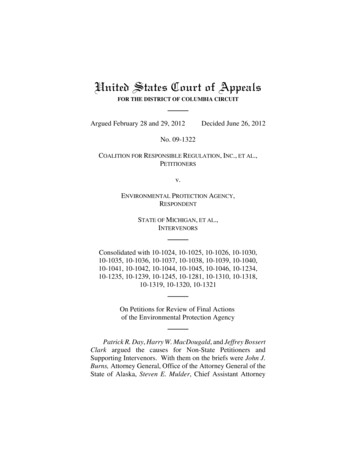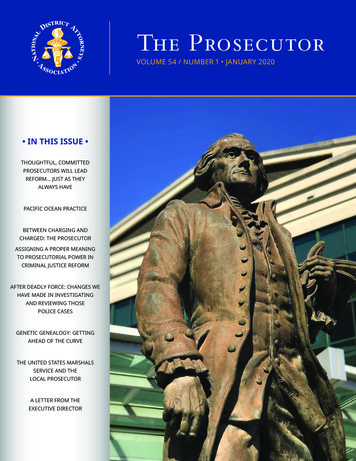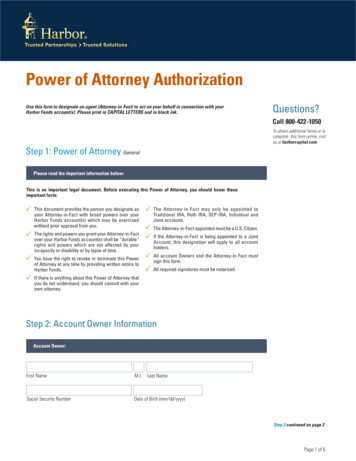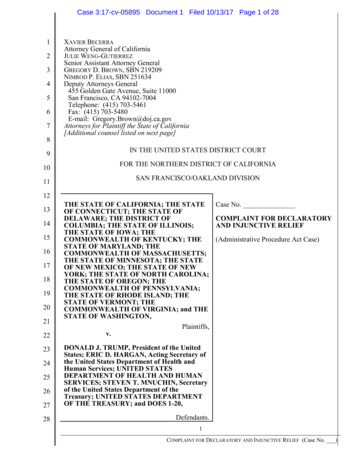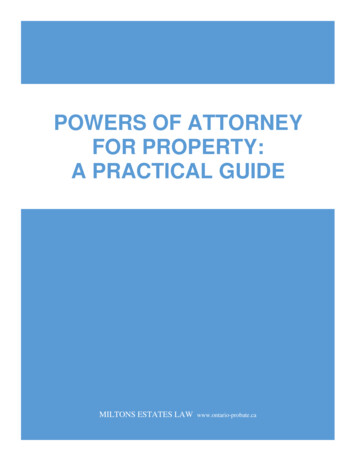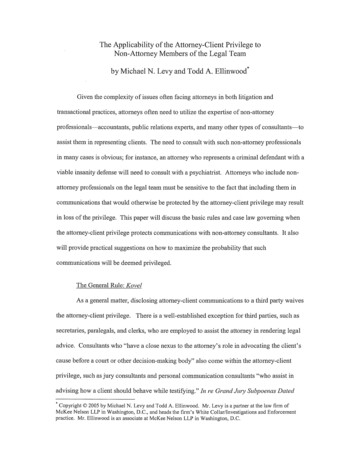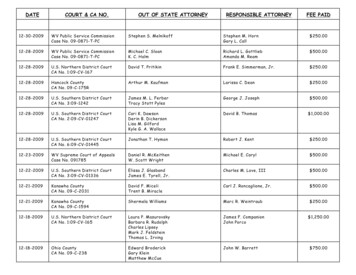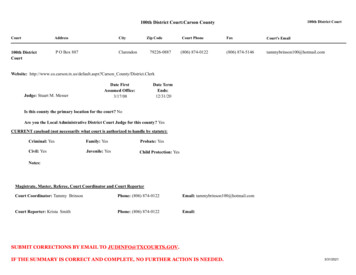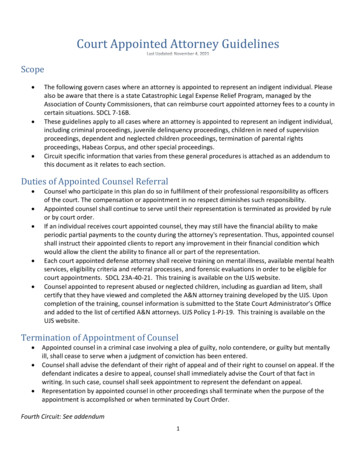
Transcription
Court Appointed Attorney GuidelinesScope The following govern cases where an attorney is appointed to represent an indigent individual. Pleasealso be aware that there is a state Catastrophic Legal Expense Relief Program, managed by theAssociation of County Commissioners, that can reimburse court appointed attorney fees to a county incertain situations. SDCL 7-16B.These guidelines apply to all cases where an attorney is appointed to represent an indigent individual,including criminal proceedings, juvenile delinquency proceedings, children in need of supervisionproceedings, dependent and neglected children proceedings, termination of parental rightsproceedings, Habeas Corpus, and other special proceedings.Circuit specific information that varies from these general procedures is attached as an addendum tothis document as it relates to each section.Duties of Appointed Counsel Referral Counsel who participate in this plan do so in fulfillment of their professional responsibility as officersof the court. The compensation or appointment in no respect diminishes such responsibility.Appointed counsel shall continue to serve until their representation is terminated as provided by ruleor by court order.If an individual receives court appointed counsel, they may still have the financial ability to makeperiodic partial payments to the county during the attorney's representation. Thus, appointed counselshall instruct their appointed clients to report any improvement in their financial condition whichwould allow the client the ability to finance all or part of the representation.Each court appointed defense attorney shall receive training on mental illness, available mental healthservices, eligibility criteria and referral processes, and forensic evaluations in order to be eligible forcourt appointments. SDCL 23A-40-21. This training is available on the UJS website.Counsel appointed to represent abused or neglected children, including as guardian ad litem, shallcertify that they have viewed and completed the A&N attorney training developed by the UJS. Uponcompletion of the training, counsel information is submitted to the State Court Administrator’s Officeand added to the list of certified A&N attorneys. UJS Policy 1-PJ-19. This training is available on theUJS website.Termination of Appointment of Counsel Appointed counsel in a criminal case involving a plea of guilty, nolo contendere, or guilty but mentallyill, shall cease to serve when a judgment of conviction has been entered.Counsel shall advise the defendant of their right of appeal and of their right to counsel on appeal. If thedefendant indicates a desire to appeal, counsel shall immediately advise the Court of that fact inwriting. In such case, counsel shall seek appointment to represent the defendant on appeal.Representation by appointed counsel in other proceedings shall terminate when the purpose of theappointment is accomplished or when terminated by Court Order.Fourth Circuit: See addendum1
Compensation Unless appointed counsel has a contract providing otherwise, all appointed counsel will be justlycompensated for reasonable legal services in an amount fixed on an hourly basis. The schedule of courtappointed attorneys' fees will be uniform throughout the State of South Dakota and will be publishedeach year by the State Court Administrator’s Office.The rate effective as of January 1, 2022, is 101.00 per hour. Current compensation rates can be foundon the UJS website.All claims for compensation must be reasonably necessary and the amount must be reasonably valued.See Duffy v. Circuit Court for the Seventh Judicial Circuit, 2004 SD 19, ¶ 14-17, 676 NW2d 126(discussing factors in determining the reasonableness of attorney fees).Second Circuit: See addendumSixth Circuit: See addendumVouchers for Payment All requests and vouchers for the payment of attorney's fees and expenses must be itemized andsubmitted to the assigned judge for approval on the date of completion of the case or no later than 30days after the case is completed unless otherwise approved by the court for good cause shown.Upon application by counsel and for good cause shown, the judge presiding in the case may authorizeinterim payments for services provided or waive payment deadlines.Please utilize the Court Appointed Counsel Voucher for Compensation & Expenses form whensubmitting your claims. This form is available on the UJS website.Failure to follow established rules will result in refusal to approve the bill or voucher for such expense.First Circuit: See addendumSecond Circuit: See addendumFourth Circuit: See addendumSixth Circuit: See addendumSeventh Circuit: See addendumTravel Travel will be paid at a rate per mile for necessary travel. No trips are to be made out of the countywhere a matter is pending without prior approval of the judge, except for travel to and from theattorney’s office, court or any jail, detention facility or the penitentiary where the individual they arerepresenting is being held. Travel will be paid at the rate of 1.00 per mile for both the use of theautomobile and for the attorney’s travel time.Second Circuit: See addendumSeventh Circuit: See addendumApproval or Disapproval of Attorney’s Fees and Costs If the full amount of the voucher or statement for fees by counsel is not approved by the trial judge,the trial judge must explain, either orally or in writing, the reasons for change or modification of thestatement or voucher submitted by counsel.2
If the attorney is dissatisfied with the amount of compensation allowed by the trial judge, the attorneymay request that a three-judge panel in that circuit review the claim for compensation and hold ahearing. A decision by the majority of the judges on the panel shall become the amount of fees andcosts authorized.Third Circuit: See addendumFifth Circuit: See addendumSeventh Circuit: See addendumExperts A motion to hire expert witnesses must be made in writing to the judge presiding in the case. Thismotion must be:a. made in good faith;b. reasonable in all respects;c. timely and specifically set forth the necessity of the expert; andd. specify that the client is financially unable to obtain the required service himself and that suchservices would otherwise be justifiably obtained were the client financially able.i. Counsel must verify with their client that the client is not financially able to retain thedesired service as of the time the motion is made.If the judge approves the motion, the order of appointment shall set a ceiling on the amount whichcan be expended for this purpose. That ceiling includes total outlay for the expert's services andexpenses and cannot be exceeded without prior court authorization. Counsel shall send a copy of theorder of appointment to the expert so that he or she has notice of the ceiling.If possible, experts from the immediate area of the proceedings should be appointed.Fifth Circuit: See addendumSeventh Circuit: See addendumAppointment of Co-Counsel Because of their grave nature or complexity, certain cases can jeopardize an appointed counsel'spractice and sometimes draw into question whether a person will receive effective assistance ofcounsel. In such cases, counsel may request the court to appoint co-counsel to be paid at the ratesestablished herein. The approval or disapproval of such application for co-counsel rests in the sounddiscretion of the trial judge.Expenses, Paralegals, and Investigators Appointed counsel shall be allowed reimbursement for reasonably incurred expenses. Costs shall belimited to reasonable copying costs, subpoena service fees, telephone charges, fax charges, fees forobtaining records, and similar expenses.Costs ascribed to overhead, such as word processing, messengers, secretarial services, and similarexpenditures shall not be allowed.Charges for electronic research services such as Lexis or Westlaw will not be allowed unless by priorwritten court order upon a showing of special need.Counsel may subcontract services if these services can be provided at a reduced rate. Services of aparalegal or investigator must comply with the above section entitled "Experts".3
Services of a paralegal or investigator must comply with the above section entitled "Experts".Second Circuit: See addendumFourth Circuit: See addendumFifth Circuit: See addendumSixth Circuit: See addendumSeventh Circuit: See addendumAddendumTermination Fourth Circuit: Any additional legal work performed in sentence reduction matters or other postjudgment matters is not compensable unless a new order of appointment is entered.Compensation Second Circuit: Legal services should be billed at the rate in effect at the time the service wasrendered. All flat fees have been eliminated. Counsel should also be aware of the following SecondCircuit Local Rules:a. CIV EIGHT. COURT APPOINTED ATTORNEYS. In all actions, suits and proceedings, where thecourt appoints an attorney to be paid with public funds, the initial appointment is authorizedfor an amount not to exceed one thousand five hundred dollars. The court appointed attorneymust obtain prior approval, by a motion and an order from the judge assigned to the case, toexceed the approved amount. A hearing on the motion need not be scheduled unlessrequested by the court.b. CR NINE. COURT APPOINTED ATTORNEYS. In criminal cases where the court appoints anattorney to be paid with public funds, the initial appointment is authorized for an amount notto exceed one thousand five hundred dollars. The court appointed attorney must obtain priorapproval, by a motion and an order from the judge assigned to the case, to exceed theapproved amount. A hearing on the motion need not be scheduled unless requested by thecourt. Sixth Circuit Legal services should be billed at the rate in effect at the time the service was rendered.All flat fees have been eliminated.Vouchers for Payment First Circuit: When the attorney is representing a defendant on multiple cases, a combined voucher forpayment is NOT allowed. A separate voucher must be filed for each case and the fees and expensesreasonably apportioned between each case. Where one or more of the cases has been dismissed thesentencing court will direct the attorney as to how to apportion the invoices. No voucher would befiled in a dismissed case unless all cases are dismissed. Invoices attached to vouchers must show thefees and expenses for each individual case or clearly show how the fees and expenses have beenapportioned between the cases. All vouchers must be filed through File and Serve. When courtappointed attorneys are handling lengthy cases, interim vouchers should be filed annually at a4
minimum, but preferably every six months. Attorneys should use the 1st Circuit CAA Voucher Formavailable on the 1st Circuit website.Second Circuit: All invoices and vouchers for the payment of attorney's fees and expenses must beitemized and submitted to the assigned judge for approval no later than 90 days after the case iscompleted unless otherwise approved by the court for good cause shown.Third Circuit: Interim billings for court-appointed attorney fees are allowed, to eliminate thesubmission of large bills to a county for expenses incurred, especially from a different fiscal year, or toprevent confusion due to the changing of rates set by the Supreme Court.Fourth Circuit: Absent prior authorization, court-appointed counsel in all criminal and committal casesshall submit to the Court one billing or court-appointed counsel fees at time of sentencing ordisposition of the case, which will be made a part of the sentence or order. Juvenile courtappointments may be billed on a monthly or quarterly basis. Failure to submit billings within the timeprovided in this policy may result in the court denying payment of court appointed counsel fees, inwhole or in part. The Court may waive the application of this policy for good cause.Fifth Circuit: Upon application by the defense attorney, in a trial of greater than normal length, thejudge presiding in the case may authorize monthly payments to that attorney for services provided.Vouchers submitted outside of the 30-day period shall be accompanied by a separate statement outlining goodcause for the delay. Sixth Circuit: Requests for payment of court-appointed counsel fees should be presented to the courton the date of the completion of the case, but in no event later than 30 days after the case is completebefore the circuit court. Failure to submit the fee requests within the time provided in this policy mayresult in the court denying payment of court appointed counsel fees, in whole or in part. The court maywaive the application of this policy for good cause shown.Seventh Circuit: Absent prior authorization, court-appointed counsel in all criminal and committalcases shall submit to the Court one billing or court-appointed counsel fees at time of sentencing ordisposition of the case, which will be made a part of the sentence or order. Juvenile courtappointments may be billed on a monthly or quarterly basis. For complex cases, upon application bythe attorney, the Court may waive this policy and provide for interim billings. Submissions arerequired to comply with the Voucher for Compensation and Expenses of Court Appointed Counseldocument.Travel Second Circuit: Travel will be paid at the rate of 1.00 per mile for both the use of a vehicle and for theattorney’s travel time. In the 2nd Judicial Circuit, attorneys outside Sioux Falls are welcome to placethemselves on the list for court appointments in Minnehaha County. However, in light of the largenumber of local attorneys readily available nearby and in consideration of the taxpayers of MinnehahaCounty, by local policy the judges in Sioux Falls expect out of town attorneys to waive mileage chargesin Minnehaha cases unless special circumstances exist as determined by prior judicial approval. Thistravel waiver does not apply to Lincoln County cases. Travel to out-of-county correctional facilities tointerview in-custody clients when video or telephonic meetings are not practical is generallyconsidered an exception to the local policy against travel reimbursement.Seventh Circuit: Due to the availability of local attorneys, no travel costs will be paid for attorneysrepresenting clients whose case is venued in Pennington county, unless travel outside the county isnecessary and prior permission from the Judge presiding over the case has been obtained. Suchmotion may be made ex parte and under seal. Attorneys representing clients in Custer, Fall River, and5
Oglala Lakota counties must allocate their travel costs equally between all clients represented in one ofthose counties on any given court day.Approval or Disapproval of Attorney’s Fees and Costs Third Circuit: Appeals by attorneys to the Third Circuit judges regarding cuts in court-appointedattorney fees shall be reviewed under an abuse of discretion standard .Fifth Circuit:o If it appears that the total fee in any case will exceed 1,500 for a misdemeanor case and 2,500 for a felony case, prior approval from the judge assigned to try the case should beobtained before that limit is limited if counsel wishes to exceed that amount.o No Fee for any of these types of cases up to appeal may exceed 25,000. Payment forattorney fees from any source will be included in the computation. The trial judge will makea determination as to total payment considering reasonably necessary services to affect aproper defense, and the trial judge may, in their sound discretion, set a lower maximumlimit for a particular case.o In juvenile matters, which concern children in need of supervision, juvenile delinquenciesand abuse and neglect cases, no fee for any case for any one attorney may exceed 5,000.This, however, excludes costs for attorney fees that may be incurred during an appeal.Seventh Circuit: Appeals by attorneys to the Seventh Circuit judges regarding cuts in courtappointed attorney fees shall be reviewed under an abuse of discretion standard.Experts Fifth Circuit: Permission must be obtained from the trial judge before any expenditure can becommitted to hire an expert witness. The anticipated cost for services and expenses of such a witnessand the reasons for such a need must be provided to the trial judge at the time such request is made.Seventh Circuit: Permission must be obtained from the trial judge before any expenditure can becommitted to hire an expert witness. The anticipated cost for services and expenses of such a witnessand the reasons for such must be provided to the trial judge at the time such request is made. Themotion may be made ex parte and under seal. Under no circumstances shall the expert exceed theallowed cost without prior authorization from the trial judge. Expenses, Paralegal, and Investigators Second Circuit: Routine office overhead expenses such as consumable office supplies will not normallybe re-reimbursed. Counsel are encouraged to subcontract various services ordinarily done bythemselves, such as legal research and file organization, if these services can be provided at a reducedrate. Appointed counsel are also encouraged to subcontract investigation services when available at areduced rate. If appointed counsel wishes to use a paralegal or investigator, counsel must comply withthe section entitled “Experts.” The compensation rate for paralegals is 30.00 per hour.Fourth Circuit: Counsel are encouraged to subcontract various services ordinarily done by themselves,such as legal research and file organization, if these services can be provided at a reduced rate.Appointed counsel is also encouraged to subcontract investigation services when available at a6
reduced rate. If appointed counsel wishes to use a paralegal or investigator, counsel must comply withthe section entitle “Experts” and must be preapproved by the Court.Fifth Circuit: Special Investigator Fees: A request to hire an investigator when it will involve anadditional charge over and above that allowed to the attorney must be addressed to the judgepresiding in the case. If the judge approves the request, the court will set a ceiling on the amount thatcan be expended for this purpose. That ceiling includes total outlay for the investigator’s services andexpenses and cannot be exceeded without prior authorization from the judge.Sixth Circuit: If appointed counsel wishes to use a paralegal or investigator, counsel must comply withthe section entitled “Experts.” The compensation rate for paralegals is 30.00 per hour.Seventh Circuit: Counsel are encouraged to subcontract various services ordinarily done bythemselves, such as legal research and file organization, if these services can be provided at a reducedrate. Appointed counsel are also encouraged to subcontract investigation services when available at areduced rate. If appointed counsel wishes to use a paralegal or investigator, counsel must comply withthe section entitled “Experts.” The compensation rate for paralegals is 30 per hour.1-Presiding Judge Policy-19COURT APPOINTED ATTORNEY FEES – All lawyers willing to furnish services as court-appointed counselto indigent defendants will be paid for all legal services on an hourly basis as follows: 101/hr. beginningJanuary 1, 2022. Subsequently, court-appointed attorney fees will increase annually in an amount equal to thecost of living increase that state employees receive each year from the legislature. Travel will be paid at the rateof 1.00/mile for both the use of the automobile and for the attorney’s time on necessary travel. No trips are tobe made out of the county without prior approval of the judge. Rules were revised for payment by voucher,approval and disapproval of attorney’s fees and costs, special investigators, expert witnesses, capital cases.An attorney appointed to represent abused or neglected children, including those appointed as guardian adlitem shall certify that they have viewed and completed the A&N attorney training developed by the SouthDakota Unified Judicial System. The training video is available at http://ujs.sd.gov/ upon completion of thetraining the attorney’s name is sent to the State Court Administrator’s Office and added to the list of certifiedA&N trained attorneys.Requests for payment of court-appointed counsel fees should be presented to the court on the date of thecompletion of the case, but in no event later than 30 days after the case if complete before the circuit court.Failure to submit the fee requests within the time provided in the policy may result in the court denyingpayment of court appointed counsel fees, in whole or in part. The court may waive the application of thispolicy for good cause shown.If the full amount of the voucher or statement for fees by counsel is not approved by the trial judge, the trialjudge must explain, either orally or in writing, the reasons for change or modification of the statement orvoucher submitted by counsel.If the attorney is dissatisfied with the amount of compensation allowed by the judge presiding in the case, theattorney may request that a three-judge panel of circuit and/or magistrate judges appointed by the presidingjudge, or the next most senior judge in the event the presiding judge was the judge presiding in the case, inthat circuit review the claim for compensation and hold a hearing thereon. A decision by the majority of thethree-judge panel in the circuit shall become the amount of the fees and costs authorized. [SDCL 23A-40, (Rule44)]7
See Duffy v. Circuit Court for the Seventh Judicial Circuit, 2004 SD 19, ¶ 14-17, 676 NW2d 126 (discussing factors in determining the reasonableness of attorney fees). Second Circuit: See addendum Sixth Circuit: See addendum Vouchers for Payment All requests and vouchers for the payment of attorney's fees and expenses must be itemized and
